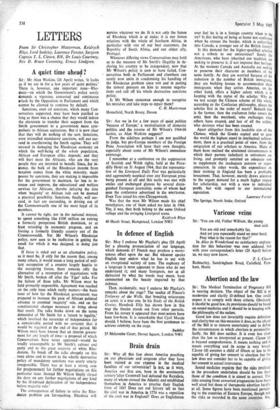A quiet time ahead ?
LETTERS
From Sir Christopher Masterman, Keidrych Rhys, Lord Sudeley, Laurence Forster, Surgeon Captain T. L. Cleave, RN, Dr Louis Courtney, Rev D. Bruce Cumming, Ernest Lindgren.
Sir: Mr Alan Watkins (28 April) writes, 'it looks as if we are in for a few years of quiet politics.' There is, however, one important issue—Rho- desia—on which the Government's policy surely demands a vigorous, concerted and continuous attack by the Opposition in Parliament and which cannot be allowed to continue by default.
Sanctions, even oil sanctions, which many Con- servatives supported, may have been justified so long as there was a chance that they would induce the electorate to transfer their support from the Smith government to a government more sym- pathetic to African aspirations. But it is now clear that they will do nothing of the sort Sanctions, even intensified mandatory sanctions, will not suc- ceed in overthrowing the Smith regime. They will succeed in damaging the Rhodesian economy on which the well-being of the whole population, African and European alike, depends; and they will hurt most the Africans, who are the very people they are intended to benefit. Since, for in- stance, the bulk of the Rhodesian income from taxation comes from the white minority, made poorer by sanctions, they are making it impossible for the government to maintain, far less to in- crease and improve, the educational and welfare services for Africans, thereby delaying the date when 'majority' or African rule can be deemed a practical possibility. Sanctions, finally, will suc- ceed, in fact are succeeding, in driving out of the Commonwealth one of the most loyal of its members.
It cannot be right, nor in the national interest, to spend something like £100 million on ruining a formerly prosperous British dominion, or at least retarding its economic progress, and on forcing a formerly friendly country out of the Commonwealth. Yet Mr Wilson's Rhodesian policy, now seen to be ineffective in getting the result for which it was designed, is doing just that.
If force is ruled out as an alternative policy, as it must be, if only for the reason that, among many others, it would mean a long period of mili- tary occupation of a country largely hostile to the occupying forces, there remains only the alternative of a resumption of negotiations with Mr Smith, broken off after the 'Tiger' talks. For the failure of these talks, Mr Wilson must be held primarily responsible. Agreement was reached on the only issue which really matters—the basic issue of how far the Rhodesian government was prepared to increase the pace of African political advance to eventual 'majority' rule, and on the constitutional changes necessary to bring about that result. The talks broke down on the terms demanded of Mr Smith for a 'return to legality,' which involved the surrender of independence for a considerable period with no certainty that it would be regained at the end of that period. Mr Wilson must have known that an interim govern- ment for any length of time—a proposal of which Conservatives have never approved—would be totally unacceptable to Mr Smith's cabinet and party and to the great majority of white Rho- desians. To break off the talks abruptly on this issue alone and to resort to the wholly destructive policy of mandatory sanctions was surely utterly irresponsible. There was at least a strong case for postponement for further negotiations on this particular issue. Instead Mr Wilson finally closed the door on any further negotiations of any kind by his ill-advised declaration of 'no independence before majority rule.'
The consequences of failure to solve the Rho- desian problem are far-reaching. .Rhodesia will survive whatever we do. It is not unly the future of Rhodesia which is at stake; it is our future relations with the whole of Southern Africa, in particular with one of our best customers, the Republic of South Africa, and our oldest ally, Portugal.
Whatever differing views Conservatives may hold as to the measure of Mr Smith's illegality in de- claring his country to be independent, now that Mr Wilson's policy is seen to have failed, Con- servatives both in Parliament and elsewhere can surely now unite in condemning his handling of the Rhodesian problem since UDI and in putting the utmost pressure on him to resume negotia- tions and call off his whole destructive sanctions policy.
Is Mr Wilson statesman enough to recognise his mistakes and take steps to repair them?
Homefield, North Bovey, Devon C. H. Mosterman


































 Previous page
Previous page